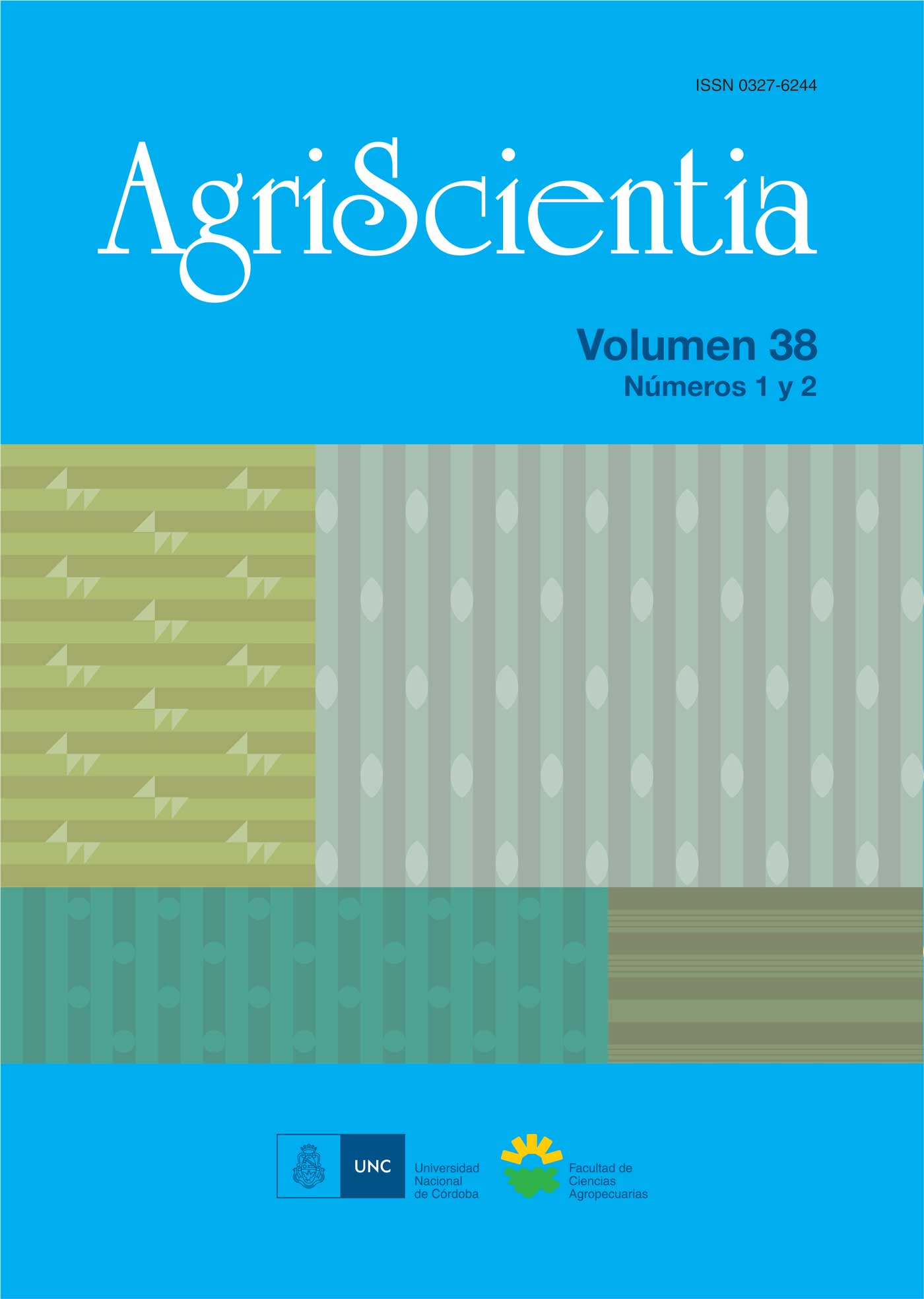New maize (Zea mays L.) varieties for semi-arid lands of Cordoba province, Argentina
Main Article Content
Abstract
The use of open pollinated varieties adapted to specific environments represents an alternative to hybrid cultivars for producers in marginal areas for whom the high cost of state-of-the-art hybrid cultivars complicates their adoption. Despite the greater yield potential of maize hybrids, open pollinated varieties can be advantageous due to its adaptation to marginal environments, yield stability, lower seed prices, and mainly because it enables the producers to obtain their own seed. Two open pollinated maize varieties were developed by recurrent selection for their adaptation to the semi-arid region of Córdoba province. The varieties obtained were compared with commercial hybrids during three years in field trials and they showed good agronomic performance in grain yield and related characteristics, grain quality and resistance to prevalent diseases.
Article Details

This work is licensed under a Creative Commons Attribution-ShareAlike 4.0 International License.
How to Cite
References
Biasutti, C. A., Casanoves, F. y Peiretti, D. A. (2000). Response to different adaptative mass selection criteria in a maize exotic population. Maydica, 45(2), 89 - 94.
Carena, M. J. (2005). Maize commercial hybrids compared to improved population hybrids for grain yield and agronomic performance. Euphytica, 141, 201–208. DOI: https://doi.org/10.1007/s10681-005-7072-0
Coors, J. G. (1999). Selection methodology and heterosis. En: J. G. Coors, y S. Pandey (Eds.), The genetics and exploitation of heterosis in crops (225 – 245). Madison, Wisconsin, Estados Unidos: American Society of Agronomy.
Darrah, L. L. y Penny, L. H. (1975). Inbred Line Extraction From Improved Breeding Populations. East African Agricultural and Forestry Journal, 41, 1-8. DOI: https://doi.org/10.1080/00128325.1975.11662769
Di Rienzo, J. A., Casanoves, F., Balzarini, M. G., Gonzalez, L., Tablada, M. y Robledo, C. W. Infostat (versión 2017) [Software]. Córdoba, Argentina: Grupo InfoStat, FCA, Universidad Nacional de Córdoba. URL: http://www.infostat.com.ar
Hallauer, A. R. y Miranda, J. B, (1988). Quantitative genetics in maize breeding (2a ed.). Ames, Iowa: Iowa State University Press.
Instituto Nacional de Semillas (INASE) (2020). Descriptor de cultivares. Recuperado de: https://www.argentina.gob.ar/variedades-vegetales/descriptor-de-cultivares/cereales
Kutka, F. (2011). Open-Pollinated vs. Hybrid Maize Cultivars. Sustainability, 3 (9), 1531-1554. DOI: https://doi.org/10.3390/su3091531
Ministerio de Agricultura Ganadería y Pesca (MAGyP) (2020). Estimaciones Agrícolas. Recuperado de: https://datosestimaciones.magyp.gob.ar/reportes.php?reporte=Estimaciones
Paliwal, R. L. (2001). Hybrid maize breeding. En: R. L. Paliwal y G. Granados, (Eds), Tropical maize improvement and production. (151 – 170). Rome, Italy: Organización de las Naciones Unidas para la Agricultura y la Alimentación.
Pixley, K. y Bazinger, M. (2002). Open-pollinated maize varieties: A backward step or valuable option for farmers? En: D. K. Friesen y A. F. E. Palmer (Eds.). Integrated approaches to higher maize productivity in the new millennium (22 – 28). Proceedings of the seventh Eastern and Southern Africa Regional Maize Conference. Nairobi, Kenia: Digital Process Works Ltd.
Pixley, K. (2006). Hybrid and open-pollinated varieties in modern agriculture. En: K. Lamkey y M. Lee (Eds.), Plant Breeding: The Arnel R. Hallauer International Symposium (234-250). Blackwell Publishing.
Prasanna, B. M., Vasal, S. K., Kassahun B. y Singh N. N. (2001). Quality protein maize. Current Science, 81 (10), 1308-1319.
Sánchez, C. y Barberis, N. A. (2013). Caracterización del territorio Centro de la provincia de Córdoba. Estación Experimental Agropecuaria Manfredi, Córdoba,
Argentina: Ediciones INTA.
Servicio Nacional de Sanidad y Calidad Agroalimentaria de Argentina (Senasa) (2020). Laboratorios. Recuperado de https://www.argentina.gob.ar/sites/default/files/detalle_analisis_-_cereales.pdf
Vaz Patto, M. C., Moreira, P. M., Almeida, N., Satovic, Z. y Pego, S. (2008). Genetic diversity evolution through participatory maize breeding in Portugal. Euphytica
161, 283–291. DOI: https://doi.org/ 10.1007/s10681-007-9481-8





